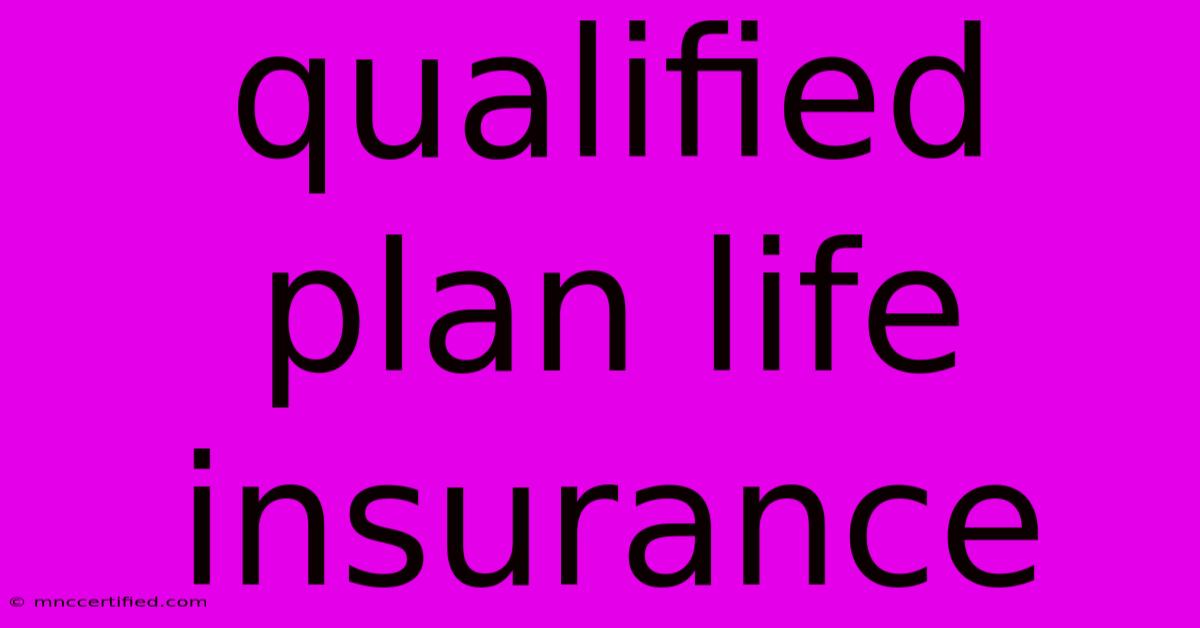Qualified Plan Life Insurance

Table of Contents
Qualified Plan Life Insurance: A Comprehensive Guide
Qualified plan life insurance is a powerful tool for securing your financial future, but it's also a complex subject. This comprehensive guide will delve into the intricacies of qualified plan life insurance, clarifying its benefits, drawbacks, and suitability for different individuals and businesses. Understanding this type of insurance is crucial for making informed financial decisions.
What is Qualified Plan Life Insurance?
Qualified plan life insurance refers to life insurance policies held within a tax-advantaged retirement plan, such as a 401(k), 403(b), or IRA. Unlike traditional life insurance policies, where premiums are paid with after-tax dollars, qualified plan life insurance allows for tax-deferred growth of cash value. This means that the money grows tax-free until it is withdrawn in retirement. This is a key differentiator and a significant advantage.
Key Types of Qualified Plans Utilizing Life Insurance:
- 401(k) Plans: Many employers offer 401(k) plans, allowing employees to contribute pre-tax dollars to their retirement accounts. Life insurance can be integrated into some 401(k) plans.
- 403(b) Plans: Similar to 401(k) plans, but typically offered by non-profit organizations and public schools. Life insurance can be included in certain 403(b) plans.
- IRA Plans (Individual Retirement Accounts): While less common, certain types of IRAs can potentially incorporate life insurance. However, this is often more complex and may involve specific strategies.
Advantages of Qualified Plan Life Insurance
The tax advantages are the primary draw of qualified plan life insurance. Here are some key benefits:
- Tax-Deferred Growth: Earnings within the policy grow tax-free until distribution. This allows your investments to compound more rapidly than in taxable accounts.
- Potential Tax-Free Death Benefit: The death benefit paid to beneficiaries may be tax-free, depending on the specifics of the policy and plan. This is a critical component for estate planning.
- Credit Protection: Assets within a qualified plan are often protected from creditors in the event of bankruptcy. This is an important feature for safeguarding your financial security.
- Estate Planning Benefits: It can help reduce estate taxes and ensure a smooth transfer of wealth to heirs. This is particularly beneficial for high-net-worth individuals.
Disadvantages of Qualified Plan Life Insurance
While offering substantial benefits, it's vital to acknowledge the potential downsides:
- Complexity: Navigating the rules and regulations surrounding qualified plan life insurance can be challenging. Professional advice is often recommended.
- Limited Access to Funds: Accessing the funds before retirement usually incurs penalties and taxes, limiting liquidity.
- Investment Risk: The cash value within the policy is subject to market fluctuations, potentially impacting returns.
- Potential for High Fees: Some plans may involve significant administrative fees or insurance charges.
Is Qualified Plan Life Insurance Right for You?
Determining if qualified plan life insurance aligns with your financial goals requires careful consideration. Factors to consider include:
- Your Retirement Goals: How much retirement income do you need?
- Risk Tolerance: Are you comfortable with the potential for market fluctuations?
- Tax Bracket: Your current and anticipated tax bracket significantly impacts the overall benefits.
- Estate Planning Needs: How do you want to distribute your assets after your death?
Consult a Financial Professional: Before investing in qualified plan life insurance, it is strongly recommended to consult with a qualified financial advisor and/or tax professional. They can help assess your specific situation, determine suitability, and guide you through the complexities involved.
Optimizing your Qualified Plan Life Insurance Strategy
Several strategies can enhance the effectiveness of your qualified plan life insurance:
- Regular Contributions: Consistent contributions over time maximize the benefits of tax-deferred growth.
- Diversification: If your plan allows, consider diversifying your investments within the policy to mitigate risk.
- Review and Adjustment: Regularly review your policy and make adjustments as your financial situation and goals evolve.
Qualified plan life insurance offers a powerful combination of tax advantages and estate planning benefits. However, its complexity necessitates thorough understanding and professional guidance. By carefully weighing the advantages and disadvantages and seeking expert advice, you can make an informed decision about whether it's the right choice for your unique circumstances. Remember, this information is for educational purposes only and not financial advice. Always consult with a qualified professional before making any financial decisions.

Thank you for visiting our website wich cover about Qualified Plan Life Insurance. We hope the information provided has been useful to you. Feel free to contact us if you have any questions or need further assistance. See you next time and dont miss to bookmark.
Featured Posts
-
More Music Halifax Piece Halls 2025 Lineup
Nov 29, 2024
-
Pci Insurance Conference 2023
Nov 29, 2024
-
Inbox Why Hes Easy To Cheer On
Nov 29, 2024
-
Iman Insurance Contact Number
Nov 29, 2024
-
Watchdog Probes Kruger On Dying Funds
Nov 29, 2024